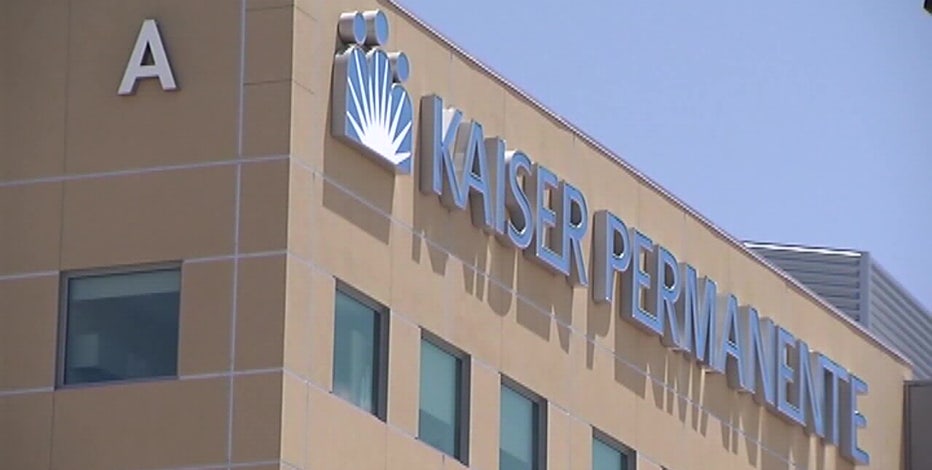Union workers authorize strike if deal not reached with Kaiser Permanente

Kaiser Permanente workers authorize strike
Tens of thousands of Kaiser Permanente workers have voted to authorize a strike. Employees are threatening to walk off the job on October 1 if the union and the health care company do not come to an agreement. If they strike, it would be the largest health care strike in U.S. history.
OAKLAND, Calif. - After months of picketing and labor negotiations, the SEIU-United Healthcare Workers West (SEIU-UHW) announced Thursday that they have authorized a strike to take place at the end of the month if they do not reach a deal with Kaiser Permanente.
The strike was passed with overwhelming support from its members, with 98% voting in favor of the strike. SEIU Kaiser Permanente in Colorado voted similarly with 99% in favor, and Kaiser in Oregon will announce their results later Thursday.
Kaiser told KTVU nearly 75% of its workers are represented by unions including almost all employees except doctors and registered nurses.
If a deal is not reached by Sept. 30, the strike would be the largest healthcare strike in U.S. history, according to union officials.
Union members and officials said they are planning a strike because of "unfair labor practices" by the organization and their "refusal" to acknowledge under-staffing and decline in patient care.
They additionally claimed their wages have not kept up with the increasing and high cost of living where Kaiser operates.
"Kaiser has failed to bargain in good faith with the caregivers who are doing everything they can to protect patient safety. Nearly 60,000 frontline workers at Kaiser facilities have overwhelmingly voted to authorize a strike because we will simply not stand by as Kaiser violates the law and puts patients at risk," said Dave Regan, president of SEIU-UHW.
Union members accused Kaiser of "slashing performance bonuses for front-line workers while paying top dollar to managers and executives who do not directly interact with patients, removing protections against subcontracting and outsourcing jobs to low-wage, for-profit companies," offering starting pay for certain entry-level positions that is less than those offered by fast-food and retail chains and refusing to make serious commitments to develop their current workforce.
Kaiser refuted their claims in a separate statement, saying they are offering a minimum payment level to prevent its employees from not receiving a payout for "nearly all its employees," and claimed the union is demanding the bonus program be turned into a "guaranteed payout regardless of one's performance, which would defeat the purpose of the program."
Kaiser said their wages have kept up with the cost of living by paying above the local market salaries.
They said they had also provided $800 million in employee assistance for their front-line workers during the pandemic. Its coalition-represented employees were paid $276 million in rewards for the past three years.
According to the union, Kaiser is failing in its commitment to fill jobs and train staff.
Fay Eastman, a patient care technician says the staff shortage is a problem.
"I love taking care of my patients because I love to see them get better…we want to provide good quality care, but it's hard to do when we don't have enough people. You have to tell Mr Jones, 'It'll be 10 minutes. Mr Jackson it's going to be another 30 minutes' it kinda wears down on you," said Eastman.
Kaiser rebutted by saying the claim was false, saying they and the Coalition agreed on hiring 10,000 new employees for Coalition-represented positions for 2023 and that to date, they have filled nearly 9,000 roles.
Kaiser healthcare workers are a part of the Coalition of Kaiser Permanente Unions, a union that represents more than 85,000 healthcare workers.
The Coalition began their "national bargaining process" back in April for the workers' contract expires Sept. 30.
Housekeeping aide Rashaad Pritchett who's a part of the bargaining team says the possible strike will have a great impact on patients.
"Nobody wants to strike. Right now it's how can we not strike," Pritchett said.
Kaiser defended their subcontracting, saying because they pay at or above market compensation, they need to be "flexible" with their workforce as needed to keep costs low for customers.
Kaiser is proposing to have an "enterprise-wide" minimum wage starting at $21 an hour. The organization said the union wants to start at $26 in response to the wage comparison to fast-food workers.
"Our very generous health care and retirement benefits add another 50% of value to the overall compensation package… Last week we made a proposal to the Coalition that includes across-the-board wage increases of between 10 and 14 percent over 4 years," Kaiser said in a statement.
This is not the first time Kaiser Permanente union members have gone on strike.
Last year, over 2,000 mental health workers went on strike with demands to increase staff and improve access to care for their patients.


